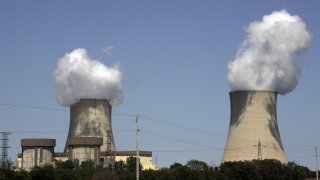
Byron, UNITED STATES: The Exelon Byron Nuclear Generating Stations running at full capacity 14 May, 2007 in Byron, Illinois, is one of 17 nuclear reactors at 10 sites in three US states, is the nation’s largest operator of commercial nuclear power plants and third largest in the world. In the US, nuclear operators have focused on improving safety and efficiency at existing plants. There have been no notable US accidents since 1979 at Three Mile Island and the US reactor fleet has produced at about 90 percent of licensed capacity since 2001, up from efficiency figures of the early 1980s. Nuclear plants today produce about 20 percent of the electricity used in the US. Dozens of electrical company?s are seeking licenses for as many as 31 new nuclear power reactors in the US. AFP PHOTO/JEFF HAYNES (Photo credit should read JEFF HAYNES/AFP via Getty Images)
Illinois Gov. J.B. Pritzker announced Friday that he had vetoed a bill that would have ended a moratorium on the construction of new nuclear power plants.
Senate Bill 76 would have allowed the resumption of construction of new reactors, and had passed the General Assembly earlier this year.
That moratorium, in place since the 1980’s, was enacted over concerns about the disposal of nuclear waste, and Pritzker cited those same concerns in a veto statement, while also expressing concerns about costs borne by ratepayers and about overly-broad language within the legislation.
“The bill is vetoed because the vague definitions in the bill, including the overly-broad definition of advanced reactors, will open the door to the proliferation of large-scale nuclear reactors that are so costly to build that they will cause exorbitant ratepayer-funded bailouts,” Pritzker said in a statement.
The governor also criticized the bill for failing to take into account potential health implications for employees and residents who would live near the newly-constructed plants.
Pritzker said he supports so-called “Small Modular Reactors,” but that he would want such construction and planning to take place in coordination with the Nuclear Regulatory Commission.
According to Capitol News Illinois, Republican State Sen. Sue Rezin, the primary sponsor of the legislation, has announced she will file paperwork to attempt to override Pritzker’s veto.
Local
The legislation passed the Senate 39-13 in March, and later passed the House 84-22 in May. Both margins would be sufficient to override Pritzker’s veto, but it remains unclear whether state Democrats will once again join with Republicans in attempting to pass the measure.
More than 400 witness slips were submitted for consideration, with a majority supporting the bill. In a show of how divided Democrats were on the measure, a slew of different labor unions expressed support, saying it could generate construction jobs and energy-sector jobs as natural gas and coal plants shut down.
Feeling out of the loop? We'll catch you up on the Chicago news you need to know. Sign up for the weekly Chicago Catch-Up newsletter here.
Climate Jobs Illinois, the Illinois Municipal League, the Illinois Manufacturer’s Association and the Illinois Farm Bureau also filed slips in support of the measure.
The Illinois Environmental Council, the Prairie State Conservation Coalition and the Sierra Club of Illinois voiced opposition, citing concerns over the environmental impacts of the plants and concerns over potential drinking water contamination around plants.
The bill would have allowed plants that meet the government’s definition of “advanced reactor,” and that those reactors would be required to meet specific safety measures and reduced waste yields, according to Rezin’s office.